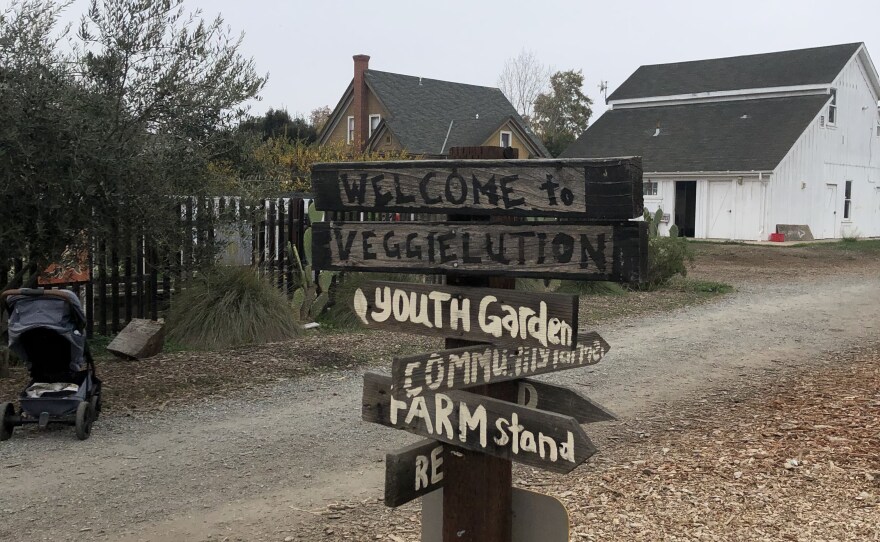When I first arrived at Emma Prusch Farm Park, I was greeted by a slew of chickens walking around carefree in the parking lot. The chickens were clearly used to all the visitors, evident by the nonchalance they exhibited as I tried to drive around them to get into a parking spot. Some of the chickens were even standing on people’s cars.
The farm is noisy and colorful, with hand painted wooden signs shaped like cows as you walk in, and signs directing you where to go to see the gardens or animal petting area. The farm sits right under the 101 and 680. It's the biggest urban farm in San Jose.
What started as a direct-response to COVID-19 shutdowns has turned into a full-fledged operation. The Eastside Connect program, in partnership with the Silicon Valley Bicycle Coalition, delivers fresh, local produce to low-income communities via bike, as a way to develop more sustainable and eco-friendly food systems.
Veggielution operates out of two locations: the farm in East San Jose and a warehouse downtown. At the warehouse, stacks of cardboard produce boxes line up on plastic tables, filled to the brim with fresh vegetables waiting to be packed away and sent down the assembly line. The produce boxes are then stacked in towers on wooden pallets, ready for transport. These produce boxes will then be delivered to families or available for pick up at the farm.
At the farm, I spoke to a couple who have been volunteering since the start of the program in March 2020. In fact, Jon and Miki have not missed a single bike day.
The bikers typically get assigned to the same routes. John and Miki’s route takes them further east towards the neighborhoods around Cesar Chavez Elementary. Their 20 to 30 mile journey takes them about two hours to finish. As a part of COVID-19 safety precautions, bikers are instructed to simply drop off farm boxes at the families’ doorsteps.
“One time, when we delivered the vegetable box, one elderly couple walking on the street — I think they were taking a walk and they knew us delivering their vegetable box, and they were so appreciative and they said, ‘God bless you. Thank you so much.’ And we really felt great.”Miki
Outside of Veggielution, Jon has been an avid biker — doing adventure biking in his free time. He got Miki into biking through volunteering with the Silicon Valley Bicycle Coalition and Veggielution. Typically, bikers borrow a trailer from Veggielution to transport anywhere from four to eight boxes per bike. Jon walks us through his slightly different set up, where he straps the boxes to the body of his bike for better weight distribution and easier turns.
They also humor me with a tour of their bikes and gear.
“I had a bike that was like this, it was a Diamondback Topanga from 1995, but when I did the first bicycle trip in Africa for the World Tour-type stuff I do, maybe the third to the last day of the trip, we were in the middle of nowhere, kind of at a crossroads and this car was stopped there and three young blonde ladies jumped out. Turns out they were in the Peace Corps and they had just arrived. And one of them says, ‘Oh, I wish I brought a bike.’ And, in my mind, I was doing the calculation that it would probably cost $200 to get the bike shipped back home, so I sold it to her for $15. Then I came home and started missing that bike, so I started looking on Craigslist for a replacement and that's what this is.”John
I also spoke with Emily Schwing, Veggielution’s public affairs director. I asked her about her work around sustainable food systems.
“So, a food system is basically from the seed that goes into the ground to what happens to your food after it's done, the compost. So, it's everything from where are the seeds getting purchased, where are they getting planted? How are those individuals being treated who are growing those produce? Every step of the way is part of the food system. How far does it travel to get to either the grocery store or the farmers market? How is it being sold? And then, is it culturally relevant?”Emily Schwing
She discusses the role of urban farms in building accessible and sustainable food systems, especially in lower-income areas.
“Urban farming is definitely an important aspect when we think about the food system. Urban farms are not going to necessarily solve our food system crisis around being able to have access to local produce. But, those spaces do teach and educate individuals the importance of locally grown vegetables. So, the urban farm is kind of one entry point for individuals to get involved in the local food system. It's important for us at Veggielution not only to talk about food system work, but food sovereignty work — that the individuals who are receiving this produce are also at the center of being able to make those decisions, that they have a choice in where they want their produce to come from and where they want their produce to go, and how they want to purchase it.”Emily Schwing
Veggielution and the Silicon Valley Bicycle Coalition are always looking for volunteers. To sign up to pack produce boxes or do bike deliveries, visit the Veggielution website. You can also visit their farm stand at Emma Prusch Park every Saturday, which takes EBT and CalFresh.



